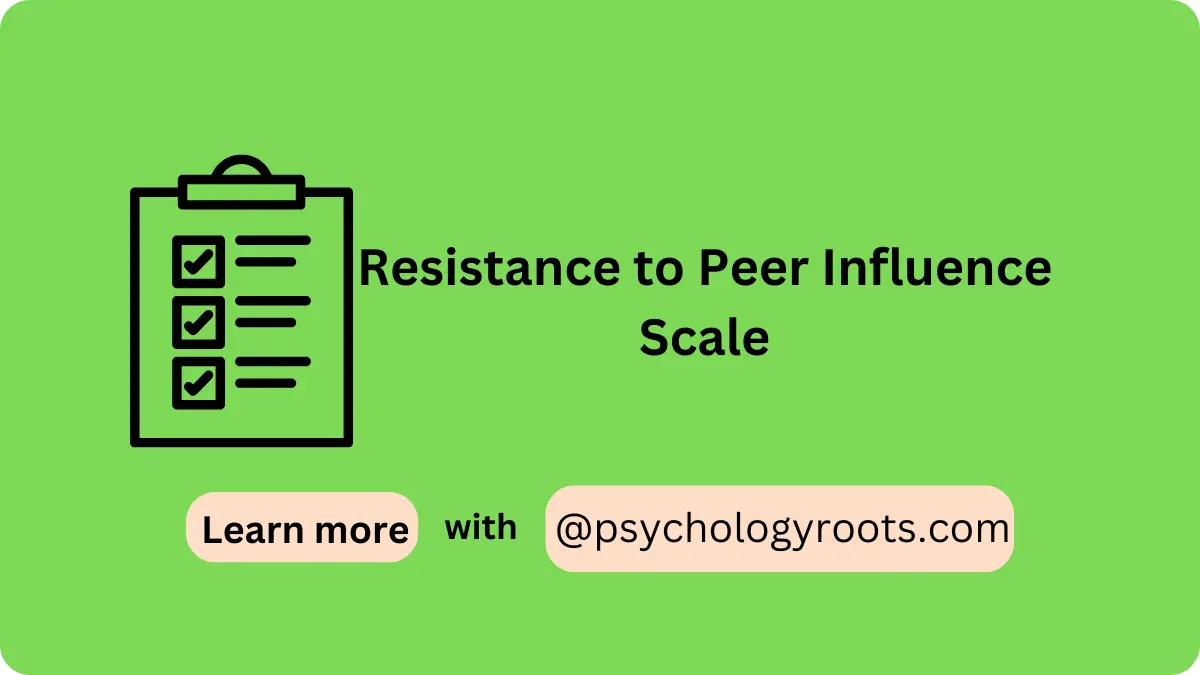Table of Contents
Resistance to Peer Influence Scale
Here in this post, we are sharing the “Resistance to Peer Influence Scale”. You can read psychometric and Author information. We have thousands of Scales and questionnaires in our collection (See Scales and Questionnaires). You can demand us any scale and questionnaires related to psychology through our community, and we will provide you with a short time. Keep visiting Psychology Roots.
About Resistance to Peer Influence Scale
Scale Name
Resistance to Peer Influence Scale
Author Details
Laurence Steinberg and Kathryn C. Monahan (2007)
Translation Availability
English

Background/Description
The Resistance to Peer Influence Scale (RPI), developed by Laurence Steinberg and Kathryn C. Monahan in 2007, is a self-report questionnaire designed to assess adolescents’ ability to resist peer pressure and make autonomous decisions in social contexts. Rooted in developmental psychology, the RPI focuses on individual differences in susceptibility to peer influence, a critical factor in adolescent risk-taking and decision-making. Cited in Steinberg and Monahan (2007), it aligns with theories of social development and self-regulation, particularly relevant to understanding delinquency and prosocial behavior (Steinberg, 2008).
The RPI comprises 10 pairs of statements (20 items total), each presenting two contrasting behaviors (e.g., “Some people go along with their friends just to keep their friends happy” vs. “Other people refuse to go along with what their friends want to do, even though they know it will make their friends unhappy”). Respondents choose the statement that better describes them and indicate whether it is “Really true” or “Sort of true” on a 4-point scale (1 = “Really true” for low resistance, 4 = “Really true” for high resistance). Scores are averaged across the 10 pairs (range: 1-4), with higher scores indicating greater resistance to peer influence. Validated in adolescent samples (ages 10-18), the RPI is used to predict risk-taking behaviors, assess social autonomy, and inform interventions for peer-related challenges.
Psychologists, developmental researchers, and educators use the RPI to evaluate adolescents’ resistance to peer pressure, study its role in behavioral outcomes, and design programs to enhance decision-making skills. Its unique paired-statement format and strong psychometrics are strengths, though limited translations and specificity to adolescents may constrain broader use.
Administration, Scoring and Interpretation
- Obtain a copy of the scale from authorized sources, such as Steinberg and Monahan (2007) in Developmental Psychology (Vol. 43, pp. 1531-1543) or APA PsycTests (https://doi.org/10.1037/t26201-000), ensuring ethical use permissions.
- Explain the purpose to respondents, noting that it assesses how they respond to peer influence to support understanding of decision-making, emphasizing anonymity and using age-appropriate, non-judgmental language.
- Provide instructions, asking respondents to choose which statement in each pair better describes them and indicate if it is “Really true” or “Sort of true” based on their typical behavior in social situations.
- Approximate time for completion is 3-5 minutes, given the 10-pair format.
- Administer in school, clinical, or research settings, using paper or digital formats, ensuring a private environment. Oral administration may be used for younger adolescents or those with reading difficulties.
Reliability and Validity
The RPI has robust psychometric properties, as reported in Steinberg and Monahan (2007). Internal consistency is good (Cronbach’s α ≈ 0.70-0.80 across adolescent samples). Test-retest reliability is moderate to high (r ≈ 0.65-0.75 over 2-4 weeks), indicating stability.
Convergent validity is supported by correlations with related constructs, such as self-reliance (r ≈ 0.40-0.60) and lower correlations with risk-taking behaviors (r ≈ -0.30 to -0.50). Discriminant validity is evidenced by weaker correlations with unrelated constructs, like academic performance (r < 0.20). Criterion validity is demonstrated by predicting delinquency, substance use, and prosocial behaviors in longitudinal studies. Factor analyses confirm a unidimensional structure, supporting construct validity. Cross-cultural studies show consistent psychometrics, though Spanish adaptations may require further validation. Pairing with measures like the Youth Self-Report (Achenbach, 2001) can enhance assessment of adolescent behavior.
Available Versions
10-Items
Reference
Steinberg, L., & Monahan, K. C. (2007). Age differences in resistance to peer influence. Developmental psychology, 43(6), 1531.
Important Link
Scale File:
Frequently Asked Questions
What does the Resistance to Peer Influence Scale measure?
It measures adolescents’ ability to resist peer pressure and make autonomous decisions.
Who can use the scale?
Psychologists, developmental researchers, and educators studying adolescents (ages 10-18).
How long does the scale take to complete?
It takes about 3-5 minutes.
Is the scale specific to certain groups?
It targets adolescents, with some cross-cultural adaptations.
Can the scale inform interventions?
Yes, its strong psychometrics support interventions for decision-making and risk reduction.
Disclaimer
Please note that Psychology Roots does not have the right to grant permission for the use of any psychological scales or assessments listed on its website. To use any scale or assessment, you must obtain permission directly from the author or translator of the tool. Psychology Roots provides information about various tools and their administration procedures, but it is your responsibility to obtain proper permissions before using any scale or assessment. If you need further information about an author’s contact details, please submit a query to the Psychology Roots team.
Help Us Improve This Article
Have you discovered an inaccuracy? We put out great effort to give accurate and scientifically trustworthy information to our readers. Please notify us if you discover any typographical or grammatical errors.
Make a comment. We acknowledge and appreciate your efforts.
Share With Us
If you have any scale or any material related to psychology kindly share it with us at psychologyroots@gmail.com. We help others on behalf of you.